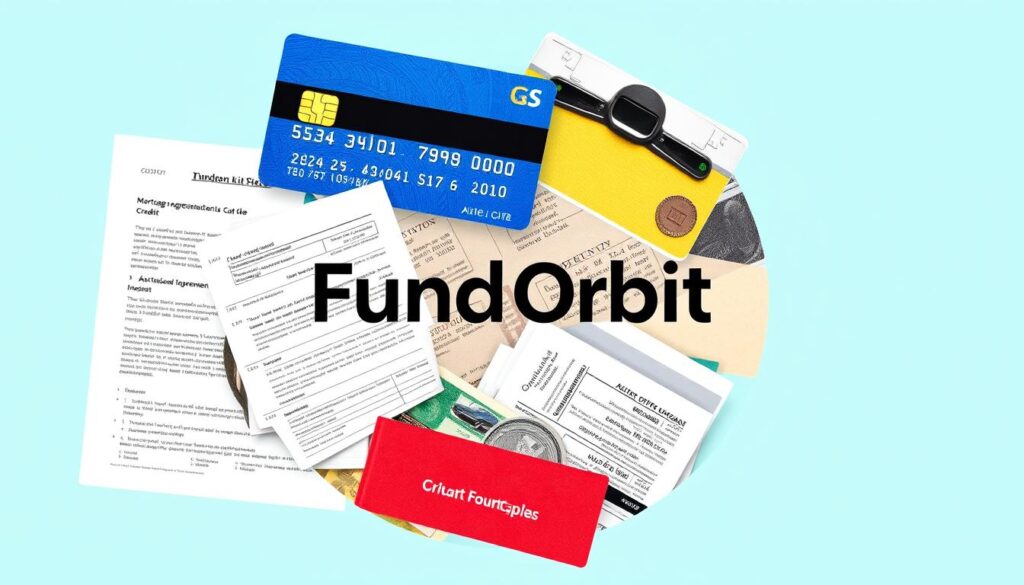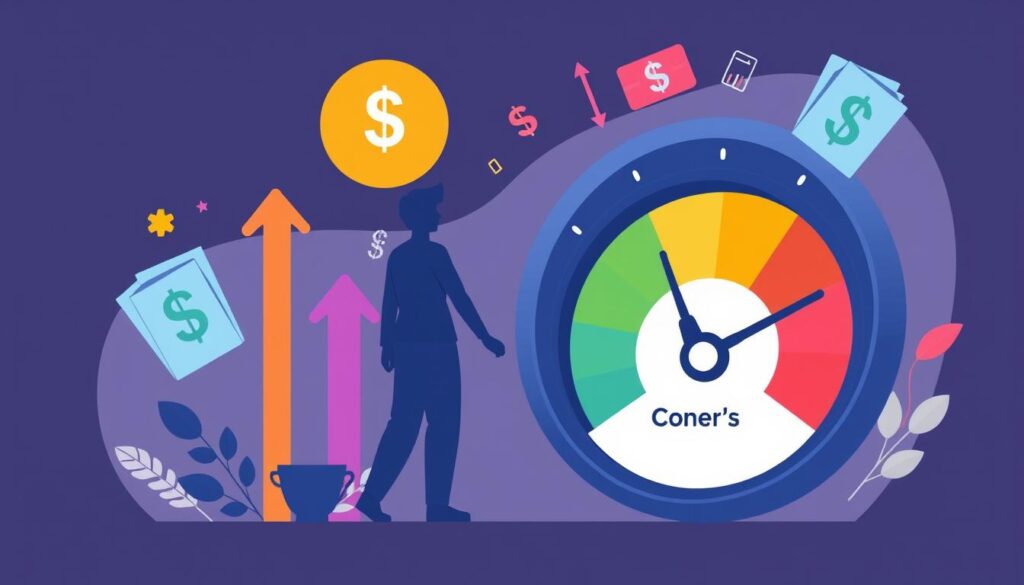Improving your credit score might seem hard, but it’s easier than you think. To boost your score, you need to know how it’s calculated and what affects it. Payment history and credit utilization are key, making up 65% of your score.
Using credit cards and loans wisely is key. Make timely payments and reduce your debt. Keeping your credit utilization below 30% is best. By doing this, you can improve your score and reach your financial goals.
Good credit management can save you a lot of money over time. You can get free weekly credit reports and use secured cards to build credit. Always pay your secured card bill on time to keep your score high.
Key Takeaways
- Payment history accounts for 35% of the FICO score, making it the most important factor in how to improve credit score.
- Credit utilization makes up 30% of the FICO score, and the optimal rate is to use less than 30% of your credit limit.
- Individuals with excellent credit can save hundreds of thousands of dollars over their lifetimes compared to those with poor credit, highlighting the importance of credit score improvement.
- We can access free weekly credit reports from all three major credit bureaus to track our credit scores and identify areas for improvement.
- Using credit cards and loans effectively is key in boosting credit score and achieving financial goals.
- By following the right strategies, we can achieve credit score improvement and improve our financial well-being.
- It is essential to consistently pay our secured credit card’s bill each month to avoid late fees or negative impact on scores and improve our credit utilization ratio.
Understanding Credit Scores
Credit scores are key to our financial health. A good score can help us increase credit rating and raise credit score fast. On the other hand, a bad score can mean higher interest rates and loan denials. Let’s dive into why credit scores matter and how they impact our daily lives.
To raise credit score fast, knowing what affects scores is vital. These include payment history, how much credit you use, how long you’ve had credit, the types of credit you have, and new credit. By using credit repair tips, we can boost our scores and reach our financial goals.
Here are some key factors that affect credit scores:
- Payment history (35% of FICO Score calculation)
- Credit utilization (30% of FICO Score calculation)
- Length of credit history (15% of FICO Score calculation)
- Credit mix (10% of FICO Score calculation)
- New credit activity (a few points)
By grasping these factors and applying credit repair tips, we can increase credit rating and raise credit score fast. Remember, a good credit score is vital for financial stability and security.
| Credit Score Range | Credit Risk |
|---|---|
| 300-579 | High |
| 580-669 | Medium |
| 670-739 | Low |
| 740-850 | Very Low |
Check Your Credit Report Regularly
Checking your credit report often is a key way to boost your credit score. It helps you spot mistakes and fix them, which can raise your score. You can get your report from Experian, TransUnion, and Equifax.
Where to Obtain Your Credit Report
AnnualCreditReport.com offers free reports from the three big agencies once a year. This lets you keep an eye on your report and find any mistakes or odd activity.

How to Review Your Credit Report for Errors
When you look at your credit report, watch for mistakes like wrong payment history or credit mix. Here’s how to check it:
- Make sure your personal info is right
- Look over your credit accounts and payment history
- Check your credit use ratio
By checking your report often and using smart strategies, you can make your credit score better. This leads to better financial health.
Pay Your Bills on Time
To boost your credit score, paying bills on time is key. Payment history counts for 35% of the FICO score. This makes it a major factor in improving your score. We can do this by setting up automatic payments and making sure bills are paid on time.
Creating a budget helps manage payments and avoid late fees. By focusing on timely payments, we show lenders we’re credit-responsible. This can significantly improve our scores. On-time utility and cell phone payments can boost scores by 2 to 15 points or more with Experian Boost.
The Impact of Late Payments
Late payments hurt your credit score, showing lenders you might not handle credit well. Bills not paid can stay on your report for up to seven years if sent to collections. To avoid this, set up automatic payments and budget wisely.

Setting Up Automatic Payments
Automatic payments ensure bills are paid on time. Services like Experian Boost can add these payments to your report, improving your score. On average, users see a 13-point increase in their FICO Score 8 after adding eligible payments.
By paying bills on time and using tools like Experian Boost, we can enhance our credit score. This shows lenders we’re financially responsible. It helps us reach our financial goals and improves our overall financial health. To boost your FICO score, focus on timely payments and leverage available tools.
Reduce Your Credit Card Balances
Lowering your credit card balances is key to a better credit score. Paying down debt and using less credit can really help. It’s important to know your credit utilization ratio, which shows how much credit you use versus what’s available.
There are ways to pay down debt, like debt consolidation loans or balance transfer credit cards. You might also look into debt management plans. For instance, you could combine all your debt into one loan with a lower interest rate. Or, you could move your balance to a card with a 0% APR for a while. Always make a budget and pay your bills first to avoid more debt.

- Stop using credit cards until you’ve paid off the balances
- Focus on paying off the credit card with the highest APR first
- Consider a debt management plan to negotiate lower interest rates
By following these tips and reducing your credit card balances, you can improve your credit score. This will help you achieve better credit repair.
Diversify Your Credit Mix
We can boost our credit scores by mixing different credit types. A good mix includes a credit card and a car loan or student loan. Experian says the best mix is a mix of both.
Having various credit accounts shows we handle different types well. Lenders see this as a sign of good risk. To improve your score, use a mix of credit cards, loans, and mortgages. Always pay on time to show you’re responsible.
Benefits of a diverse credit mix include:
- Improved credit scores
- Increased financial flexibility
- Easier qualification for loans
To get a diverse mix, try secured credit cards or credit-builder loans. For example, the Capital One Platinum Secured Credit Card needs a $49 or $99 deposit. It helps those with little credit history.

By mixing your credit and using smart strategies, you can boost your scores. This means having different accounts, paying on time, and keeping balances low.
Become an Authorized User
Becoming an authorized user can help improve FICO score and boost credit score improvement. It’s great for those with little credit history. By being added to someone else’s credit account, you get to benefit from their good credit habits.
Some key benefits include:
- Access to more credit, which can lower your credit use rate
- No credit check needed to become an authorized user
- Chance to start building a credit history, even if you’re under 18
Choosing the right primary account holder is key. Make smart credit choices to get the most out of being an authorized user. This way, you can improve your credit score and reach your financial goals.

Remember, being an authorized user is just one part of keeping good credit. Keep an eye on your credit score and make wise credit choices. This will help you see lasting credit score improvement.
| Benefits of Being an Authorized User | Description |
|---|---|
| Improved Credit Score | Potential to improve FICO score by being added to a credit account with good payment history |
| Access to Additional Credit | Lower overall credit utilization rate by being added to a credit account with a higher credit limit |
Avoid Opening Too Many New Accounts
When we talk about credit repair tips, it’s important to think about how new credit inquiries affect our score. We often forget that applying for many new credit accounts in a short time can hurt our credit rating. This is because lenders see it as a sign we might be taking on too much debt.
To boost our credit rating, we need to understand how new credit inquiries work. When we apply for new credit, lenders do a hard inquiry on our report. This can lower our score, even if it’s just a little. But, if we apply for many things in a short time, it can really hurt our score.
Here are some important things to remember about new credit and credit repair tips:
- Avoid applying for many credit cards or loans at once
- Make sure to space out new credit applications to not hurt your score too much
- Keep an eye on your credit report to make sure it’s right and catch any problems
By being careful with new credit inquiries and following these tips, we can improve our credit rating over time. Building a strong credit history takes time and effort. But with patience and smart credit habits, we can have a healthy financial future.
Keep Old Accounts Open
Keeping old accounts open is a smart way to boost your credit score. It shows lenders you have a long credit history. This can help you reach your financial goals.
It’s important to check your credit reports regularly. Keeping old accounts open is a big part of this. Credit utilization ratio matters a lot. Try to keep it under 30%.
To keep a good credit score, aim for a balance of 20% to 25% of your total credit limit each month.
The Impact of Account Age on Credit Score
Closing a credit account can lower your score by up to 10%. But, keeping old accounts open can help. It shows you’ve managed credit well over time.
Benefits of Long-Standing Accounts
Old accounts offer many benefits. They give you a longer credit history and a more varied mix of credit. This can improve your credit score.
By keeping these accounts open, you can show lenders you’re good at handling different types of credit. This can help your score grow over time.
How to Maintain Old Accounts
To keep old accounts active, make occasional purchases. Keep your credit utilization low. And try to avoid new credit inquiries.
Following these tips can help you maintain your old accounts. This way, you can improve your credit score as part of your credit building strategies.
Use Credit Responsibly
Using credit wisely is key to bettering your credit scores. It shows lenders you can handle credit well. This is important for many people aiming to boost their scores. By paying on time and keeping balances low, you can see your FICO score go up. This leads to better loan terms and lower interest rates.
To up your FICO score, know what affects it. Payment history counts for 35%, and credit use is 30%. Keeping balances under 30% and paying on time can really help. Also, avoiding late payments and keeping card balances low is good for your score.
- Making multiple payments throughout the billing cycle to lower the reported balance
- Keeping credit card balances in the single digits for optimal credit scoring benefits
- Avoiding high balances and interest charges by paying more than the minimum payment
By following these tips, you can improve your credit scores. Remember, bettering your credit takes time and consistent effort. Stay on track with responsible credit habits.
Monitor Your Credit Regularly
Keeping an eye on your credit is key to boosting your score. By checking your credit report, you can spot mistakes or changes that affect your score. It’s a good idea to review your report at least once a year. But, checking it four times a year can give you a clearer picture of your finances.
Free Tools for Credit Monitoring
There are many free tools to help you monitor your credit. You can get annual credit reports from Equifax, Experian, and TransUnion for free. Also, you can sign up for credit alerts to know about any changes to your report.
Some benefits of using these tools include:
- Spotting errors or wrong information on your report
- Tracking changes in your credit score
- Getting alerts for identity theft or data breaches
Understanding Credit Alerts
Credit alerts keep you updated on your report’s changes. By signing up for alerts, you’ll get notifications about new accounts or inquiries on your report.
How Monitoring Helps You Stay Ahead
Regularly checking your credit can help you avoid problems and improve your score. By finding and fixing errors, you can increase your credit rating. Following credit repair tips and staying informed can help you reach your financial goals.
| Credit Monitoring Frequency | Benefits |
|---|---|
| Annual | Identify errors or inaccuracies on your credit report |
| Quarterly | Track changes to your credit score and receive alerts for possible identity theft |
Seek Professional Help if Needed
Struggling with debt or credit issues? Seeking professional help can be a big help. Credit counseling agencies offer many services. These include debt management plans, credit counseling, and financial education.
These services can help you develop good credit building strategies. They can also improve your overall financial health.
To find a good credit counselor, follow these tips:
- Research the agency and read reviews from previous clients
- Ask for referrals from friends, family, or financial advisors
- Check for certifications from reputable organizations, such as the National Foundation for Credit Counseling
By getting professional help, you can learn more about ways to enhance credit score. You can also make a plan to reach your financial goals. With the right guidance, you can improve your credit score and enjoy better financial health.
| Credit Score Category | FICO Score Range |
|---|---|
| Poor | Less than 580 |
| Fair | 580-669 |
| Good | 670-739 |
| Very Good | 740-799 |
| Exceptional | 800+ |
Stay Informed About Credit Trends
Knowing about credit trends is key to bettering your credit score. Learning about financial education and credit scoring changes helps us make smart choices. Websites, credit agencies, and counseling services keep us updated and ready for credit scoring changes.
Credit scoring models change over time to match the financial world. Keeping an eye on these changes helps us find ways to boost our FICO score. By staying informed and active, we can improve our credit and achieve financial success in the long run.


